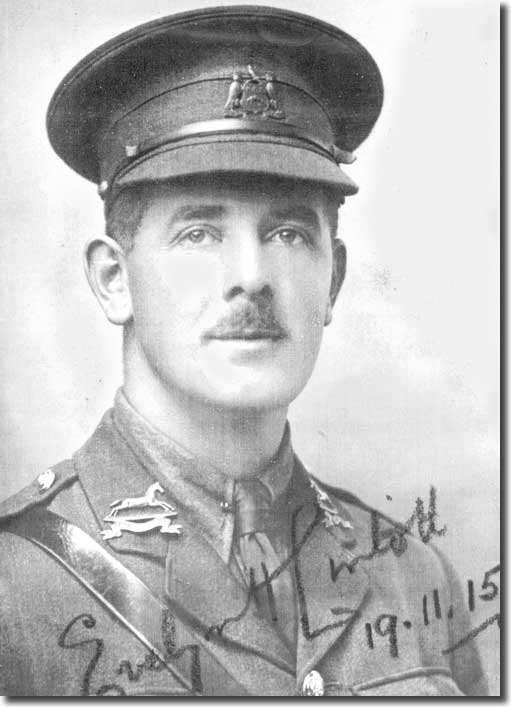 Part
1 1915/16 - Part 3 1917/18 - Part
4 1918/19 - Results and tables
Part
1 1915/16 - Part 3 1917/18 - Part
4 1918/19 - Results and tables
As the curtain closed on the 1915/16 football season,
war continued to rage on the Continent, with the conflict nearing its
second anniversary.
Four days before Leeds City's final fixture on 29 April, the German Navy
bombarded Great Yarmouth and Lowestoft; on the day of the game British
troops surrendered to Turkish forces at Kut in Mesopotamia; two days later,
British Summer Time was introduced as a 'daylight saving' measure. At
the end of May the British Government widened conscription to include
married men, later extending it further to include all men aged up to
51.
Neither side in the conflict had been able to deliver a decisive blow
though the Allies were suffering the greater number of casualties as they
made several unsuccessful attempts to break through German lines.
Wikipedia: "On 1 July 1916, the British Army endured the bloodiest day
in its history, suffering 57,470 casualties, including 19,240 dead, on
the first day of the Battle of the Somme. Most of the casualties occurred
in the first hour of the attack. The entire Somme offensive cost the British
Army almost half a million men."
One of the Somme's earliest victims was former Leeds City captain and
England half-back Evelyn Lintott,
aged just 33, who was mown down that first day, as he led an early advance.
The Yorkshire Post: "Lieutenant Lintott's end was particularly
gallant. Tragically, he was killed leading his platoon of the 15th West
Yorkshire Regiment, The Leeds Pals, over the top. He led his men with
great dash and when hit the first time declined to take the count. Instead,
he drew his revolver and called for further effort. Again he was hit but
struggled on but a third shot finally bowled him over."
Lintott's body was never found, but he is commemorated on the Thiepval
Memorial to the Missing.
The misery of the Somme continued until mid-November.
The 1916/17 football season was the second in which the normal arrangements
of competition were set aside.
There had been some agitation nationally to reintroduce payments for
players, albeit only to a limited extent, but the authorities quickly
made it clear that this flew in the face of public feeling and would simply
not be tolerated.
back to top
The previous autumn, Leeds City Football Club had been taken over by
a consortium led by Joseph Connor, president of the West Riding FA. Under
their leadership, the club had turned a financial corner and was moving
into a state of rude health. There had been a profit for the year just
ended of £673, and the directors agreed to pay '£300 on account of the
indebtedness for players to the liquidators of the old company', according
to the Leeds Mercury. 'The total gate receipts for the year were
£2,806, of which £710 was contributed by arrangement to the League Fund
and to other clubs, while £329 10s 3d has been given to charities. Included
in the season's expenditure are the following sums - Travelling expenses
£325, home match expenses £129 and rates, taxes insurance, etc £337.'
City had ended the 1915/16 campaign by winning the end of season Midland
Subsidiary Tournament, finishing ahead of five other clubs. Ever since
the arrival of Jack Peart and Clem Stephenson in February the team had
been in irresistible form, winning eight of its final twelve fixtures.
The league format which was to operate in the new season was similar
to 1915/16, with City engaged in the Midland Section, whose membership
had been expanded from 14 clubs to 16 with the addition of Rotherham County,
Chesterfield and Birmingham at the expense of Derby County.
For the time being, City would have to soldier on without the leadership
of secretary-manager Herbert Chapman,
who took on a management position at a munitions factory at nearby Barnbow
in July.
Stephen Studd: 'With his practical knowledge of mining engineering and
his nine years as a football manager, 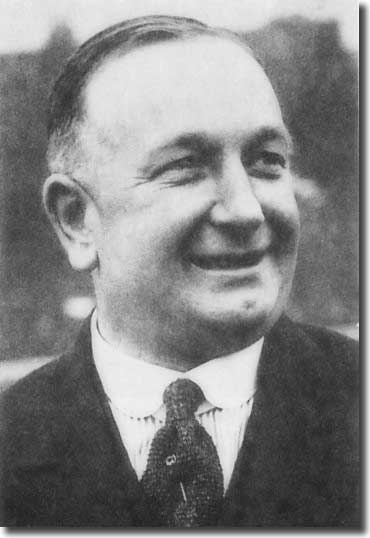 Chapman
was well equipped to deal with the demands of industrial management. The
Barnbow factory made shells, and Chapman became virtually its manager
in chief, with some thirty sub-managers under him. And just as in football
he knew how to get the most out of his resources, so in the factory he
used his skills to obtain maximum production. By the end of the war the
factory had produced more shells than any other of its size, and at 25
per cent less cost, while the output of ammunition boxes had more than
quadrupled.
Chapman
was well equipped to deal with the demands of industrial management. The
Barnbow factory made shells, and Chapman became virtually its manager
in chief, with some thirty sub-managers under him. And just as in football
he knew how to get the most out of his resources, so in the factory he
used his skills to obtain maximum production. By the end of the war the
factory had produced more shells than any other of its size, and at 25
per cent less cost, while the output of ammunition boxes had more than
quadrupled.
'On leaving Leeds City, Chapman recommended as his deputy George Cripps,
a schoolteacher and one of his assistants. He continued to advise the
club from Barnbow.' The change of leadership brought some disharmony behind
the scenes, but it would be a while before this bubbled over into genuine
conflict.
It was understood that on the playing side Mick Foley, George Law, Fred
Croot, John Edmondson, George Affleck and Billy McLeod would no longer
be able to turn out for the Peacocks and Fanny
Walden's availability would be intermittent after he joined the air
section of the Royal Naval Reserves. On the credit side, though, Manchester
United full-back Edward Hudson and Burnley
half-back Levi Thorpe declared themselves available for selection
as did Clem Stephenson's brother
Jimmy, also of Aston Villa, and Grimsby's
Tommy Mayson, both of them wingers. Bob Hewison and Harry Sherwin
continued their association with Elland Road, as did pre-war Peacocks
like Willis Walker, Charlie Copeland and Jack Hampson.
City's campaign began at Elland Road against Leicester Fosse on 2 September.
Neither Walden nor Mayson was available, and promises of an appearance
by former Woolwich Arsenal and Fulham outside-left Tommy Winship came
to nothing; McCreadie, a trialist
from Goole Town, was consequently given an opportunity on the right
wing. The City lined up thus: Walker; Copeland, Hudson; Hewison, Hampson,
Thorpe; McCreadie, C Stephenson, Peart, Price, J Stephenson.
Fosse arrived at Elland Road with only nine players and had to enlist
local replacements in Hawden and Sturdy to form their right wing attack.
Disrupted they may have been, but the visitors were 2-0 ahead after half
an hour, with Sturdy getting the second goal. Arthur Price narrowed the
deficit before half time and five minutes into the second period added
a second, heading home a nice centre from McCreadie. City could not fashion
a winner despite the fact that on the balance of play they ought to have
won comfortably, striking the Fosse woodwork on four occasions.
JRB in the Leeds Mercury: 'The two Stephensons were prominent
in both the attacks that led up to the City's goals. Jimmy Stephenson,
on the left wing, should make an admirable partner for Price, while McCreadie,
the Goole Town player, promises to be a useful outside-right. Peart, who
led the attack on several occasions last season, distributed the ball
in good style, but his shooting left room for improvement. Hampson, at
centre-half, does not appear to have lost any form, and the new wing-halves,
Hewison of Newcastle and Thorpe of Burnley, gave a good exhibition and
should be useful men to the club. Hudson of Manchester United, who partnered
Copeland at full-back, is a resolute defender. He greatly strengthened
the defence. Walker, in goal, did well, and altogether the team gave a
good display.'
back to top
It was a disappointing opening, but City found their real form in the
following weeks, reeling off seven wins on the bounce, commencing with
a 6-1 victory at Grimsby on 9 September. According to Mariner in the Leeds
Mercury, Notts County centre-forward Jack Peart, who scored two of
the goals against Grimsby, '"was the life and soul of the attack, and
I have never seen him in happier mood than on Saturday. He dribbled and
shot faultlessly, and he worked openings for the men on either side of
him with delightful impartiality.
'Nor was Price far behind in point of merit. Between them the pair gave
Ormiston a hectic afternoon. On the right wing the brothers Stephenson
played together well, and with Mayson, the old Grimsby inside-forward,
doing well at outside-left, City had a vanguard that was irresistible.
'The attackers were well supported by the middle men, who so over mastered
the home forwards that they were able to co-operate in the raids on Sewell's
charge, and Thorpe profited by one exchange to help himself to a clever
goal. Hampson was perhaps the pick, but Sherwin blended with the Stephensons
admirably. City's defence was rocklike and in striking contrast to that
of the home team, which was very erratic. Walker played excellently in
goal. Though the score may suggest that his task was a cakewalk, it was
not, and he disposed of some awkward balls from Young and the two Rippons.'
The Peacocks followed up with 5-0 victories against Notts County (thanks
to a Clem Stephenson hat trick) and Rotherham County (featuring four goals
from Price).
On 30 September Peart scored the only goal to see off Huddersfield and
a week later snatched a hat trick as City won 5-2 at Lincoln City. Leeds
arrived in Lincoln without left-back Hudson and were indebted to their
hosts for the loan of Pattison to
play on the left wing, with Arthur Price switching to left-half.
The strong wind in which the game kicked off made a passing game particularly
difficult, though Leeds coped far more ably than the home side. However,
Lincoln scored after fifteen minutes' play, Manning finishing off a fine
solo effort with a shot which glanced in off the far post. Ten minutes
later, Barnett turned to convert Manning's fine centre and the home side
was 2-0 up.
Leeds retained their cool, and gradually wore down their opponents.
Just before half time, Lincoln inside-right Cavanagh broke his leg in
a clash with Charlie Copeland and had to be stretchered off. Almost immediately,
Peart pulled a goal back. The same player equalised three minutes after
the resumption and then completed his hat trick, converting a Stephenson
centre. Pattison, the borrowed player, added a fourth and Stephenson made
it five after a splendid solo effort.
The Leeds Mercury: 'The superiority of Leeds City was apparent
throughout even when the scoring was going against them. The perfect understanding
between the players, their smartness on the ball, clean kicking and clever
passing must have given them victory even had Lincoln kept at full strength.
There was not a weak place in the team. Against such brilliant forwards,
Lincoln's backs did well but the halves were weak, and the forwards below
par.'
A goal from Stephenson was enough to defeat The Wednesday on 14 October
and a 3-1 victory at 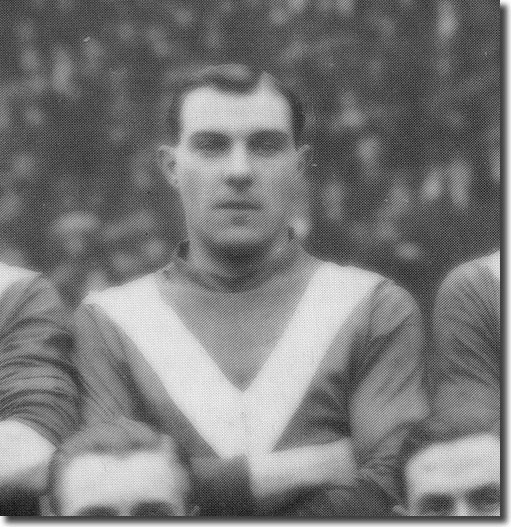 Bradford
Park Avenue the following week left City clear at the top of the table.
Bradford
Park Avenue the following week left City clear at the top of the table.
Old Bradfordian, reporting for the Mercury, described it as 'really
the most entertaining encounter so far seen in Bradford this season, and
the determination and zeal of the players, coupled with the remarkable
speed at which the match was fought, sustained interest from start to
finish.
'Leeds, though facing the breeze, were quickly into their stride, and
before Bradford knew where they were, they found themselves two goals
down. Three minutes from the opening Price scored with a fast, straight
drive, and four minutes later Howling, in clearing a centre, knocked the
ball on to Howie's head, from whence it went to Peart. The Leeds centre-forward
did not waste a second, and banged the ball into the net, leaving the
custodian helpless.
back to top
'Bradford played with fine zest, and McLeod, Robinson, Howie and Bauchop
found employment for Walker, only to see every effort thwarted. On the
run of the game Bradford had as much of the ball as Leeds, but the City
forwards were a more skilful combination, more dangerous and accurate
in their passing, and infinitely to be respected when approaching goal.
'Twenty minutes after the interval, Sherwin, in trying to kick away an
oblique shot from Cooper, put through his own goal. This was the extent
of the damage against Leeds, who scored again a quarter of an hour from
the end, Price being favoured with an open goal, after Howling had stopped
one shot. Just previously Mayson had hit the upright and Peart had missed
an easy chance.
'The Leeds defence was particularly sound; in fact, the team was admirably
balanced. Bradford, on the other hand, were lacking in finish, the inside-forwards
many times failing to carry on promising movements to a successful termination.'
Fanny Walden played against both Huddersfield and Wednesday, but those
were his final appearances for City as naval duties preoccupied more and
more of his time. In his stead, Jimmy Stephenson and Tommy Mayson were
proving their worth on the wings and the forward line as a whole terrorised
opposition defences. City's first eight games brought an aggregate goals
record of 28-6 with Peart and Price scoring nine apiece and Clem Stephenson
contributing a further six.
City's closest rivals, Birmingham, were the visitors to Elland Road on
28 October and forced a 1-1 draw. The Midlanders' kit 'went astray' en
route and kick off was delayed by almost half an hour; the game was able
to run its full length thanks to the interval being dispensed with, but
ended with spectators struggling to follow the action in the semi-darkness.
Peart hammered City into the lead following a solo run just after the
teams changed ends, but the advantage was short-lived. JRB in the Mercury:
'The incident had an electrical effect both on the crowd and the opposition,
for before the vociferous cheers of the former had died away, the Birmingham
men had scored the equalising goal, their forwards dashing straight in,
taking the City defence completely by surprise, and Hopkins, the old Cardiff
City centre, netting before hardly anyone had realised that play was in
process again.'
A week later Hull came close to being the first side to lower City colours
and it required a brilliant display from Willis Walker in goal and a second
half strike from Clem Stephenson to secure a 1-1 draw.
City were pushed all the way on 11 November by Nottingham Forest and
had to come back from a goal down to earn a 3-1 victory. They failed to
find their usual form, 'the forwards being rather feeble in attack and
the defence unreliable', according to JRB in the Leeds Mercury.
Sherwin headed City ahead from a Stephenson corner with ten minutes remaining
and in the final sixty seconds Clem Stephenson added a third from a centre
by James.
The unbeaten start came to an end on 18 November at Barnsley. With Hudson,
the Stephenson brothers and Hampson all unavailable, it was an unfamiliar
side that took the field at Oakwell. Fred Clipstone made his debut at
right-back and Barnsley lent one of their players, Kaye, to play outside-right.
Bill Toms made his second appearance
for City at inside-left. Unsurprisingly, Leeds were hammered 4-1 in a
game which kicked off half an hour late and came to a conclusion in semi-darkness.
Normal order was restored in the weeks that followed with victories over
Chesterfield (4-3), Sheffield United (2-0), Leicester Fosse (4-1, Price
hat trick) and 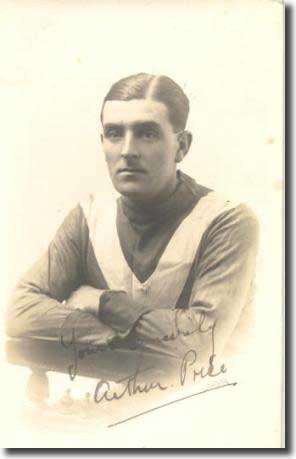 Grimsby
(1-0) as City continued to dominate the Midland Section, building up a
five-point lead on Birmingham and Huddersfield after sixteen games.
Grimsby
(1-0) as City continued to dominate the Midland Section, building up a
five-point lead on Birmingham and Huddersfield after sixteen games.
By now, 32-year-old Newcastle left-back Billy
Hampson had replaced Edward Hudson, who was struggling to get away
from his Army commitments. Hampson quickly developed a sound defensive
partnership with Charlie Copeland and went on to become a stalwart of
City's wartime campaigns.
On 23 December Leeds lost 1-0 at Notts County in a game they really should
have won, and then needed a Tommy Mayson penalty to beat Bradford City
at Elland Road on Christmas Day. The following day, they hammered the
same opponents 3-0 on their own ground. Parader in the Mercury:
'Throughout the game there was a marked propensity in the Leeds City attack,
the five forwards playing together in perfect unison, and they played
with astonishing accuracy, having regard to the wretched condition of
the pitch. The two Stephensons were a grand pair and Price and Mayson
were equally good on the opposite wing, whilst Jack Peart led the line
with his usual spirit.'
back to top
City ended 1916 by beating Rotherham County 2-0 on 30 December, increasing
their lead over Huddersfield Town to seven points.
They took the lead with a minute on the clock, Mayson picking up a long
clearance from Copeland to fire home from distance. Just before half time,
Bob Hewison increased the lead with a shot from thirty yards after Price's
initial burst had brought goalkeeper Wilkinson out of his area. City secured
the points with ease despite ending the contest with nine men after Hewison
(ribs) and Clem Stephenson (foot) were forced out of the action.
On New Year's Day, City met Liverpool, leaders of the Lancashire Section,
at Newcastle in a match played to raise funds for war charities. Leeds
were the better team early on, but feeble finishing cost them and they
lost 4-1. Two of the Liverpool goals came when City had men off injured,
while Mayson failed with a penalty.
City faced second-placed Huddersfield Town at Leeds Road on 6 January
without Bob Hewison, Jack Hampson, Clem Stephenson and Arthur Price. Ashington
left winger Sandy Trotter, Preston
left-half George Dawson and Sunderland inside-forward Billy Moore,
who had won England amateur honours, filled the void.
A closely-fought contest was still goalless at the break, Huddersfield
having one effort chalked off for offside. A minute into the second period,
City took the lead. After a vain appeal for hands in the Terriers' area
and with goalkeeper Lindon yards off his line, Mayson fed Trotter and
his shot beat the covering back to billow the net. Huddersfield equalised
from a penalty given for handball against Charlie Copeland and the game
finished 1-1.
Price returned in place of Trotter a week later at home to Lincoln and
scored City's second goal in a routine 3-1 victory. The Mercury
boasted confidently that 'it is now practically certain that they will
be this season's champions.'
Willis Walker sprained his ankle in the game and Blackburn
Rovers keeper Alf Robinson, training in a local Army camp, deputised
the following week against The Wednesday in Sheffield; Arthur Price was
also absent but Clem Stephenson returned. The home side took the lead
on the half hour, but Jimmy Stephenson equalised just before the break.
Jack Peart put City ahead five minutes after the resumption with a low
drive and they seemed set to secure the points. In the closing minutes,
though, Dawson failed to cut out a pass to Kirkman, who equalised for
Wednesday.
Four further draws followed, a breathtaking 3-3 result at Nottingham
Forest concluding the run on 17 February.
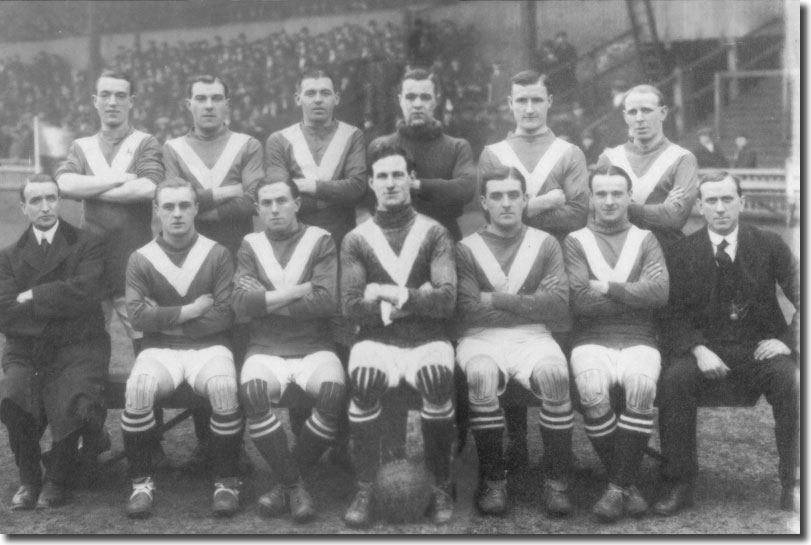 The
Leeds Mercury reported thus: 'The meeting of Nottingham Forest
and Leeds City provided the finest and most exciting game of the Notts
season. It was a charming contrast in styles; Forest exhibited their traditional
short passing, while the City played a typical wing to wing game.
The
Leeds Mercury reported thus: 'The meeting of Nottingham Forest
and Leeds City provided the finest and most exciting game of the Notts
season. It was a charming contrast in styles; Forest exhibited their traditional
short passing, while the City played a typical wing to wing game.
back to top
'Peart displayed any amount of energy, and the wings, following his splendid
example, gave the Forest defence many anxious moments. The old Notts centre-forward
manipulated the ball in lively fashion, despite the fact that Wightman
played the part of policeman to him.
'In one characteristic effort, Peart could not find a shooting position,
Jones hampering him, but the next time he got within striking distance
he deftly transferred the ball to Moore, who had Lawrence beaten in a
twinkling with a fine cross shot. Copeland and Hampson's conspiracy to
beat the Forest forwards by the offside game succeeded for a while, but
eventually Tinsley slipped in to drive home a capital low centre from
Timmins.
'Lawrence thrice saved from Price, Peart and Moore before Godfrey, Forest's
Yorkshire centre-forward, went away at top speed to beat Robinson with
a swerving shot. There had been an interval of just two minutes between
each goal, but only eight minutes elapsed before Leeds City got on terms.
Stan Robinson, who had many times
distinguished himself, drove the ball against the post on Lawrence's right,
and, the ball rebounding to the foot of Peart, it was coolly turned into
the net.
'Two goals all at half-time was a fair indication of the play before
the interval. Leeds were stronger than the Forest at half-back, Hewison
and Thorpe being particularly sound. Forest, however, were cleverer forward,
if not so fast. Godfrey received great assistance from his partners, whereas
Peart, in the City centre, had, in the main, to make his own openings.
Initiating an attack just after the interval, Peart gained for the City
another fine goal, and incidentally the lead; but this advantage was not
held long, for Godfrey repeated his 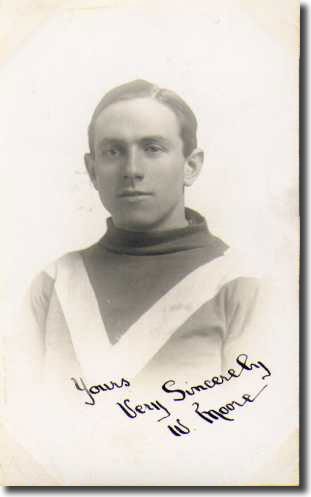 previous
performance and put on the equalising goal for the Forest.
previous
performance and put on the equalising goal for the Forest.
'Two good teams, well matched, sums up the contest, which was the best
seen in Nottingham since peacetime football.'
Despite the succession of dropped points, City maintained a clear lead
at the top of the table. Barnsley had emerged as their strongest challengers,
though with just three games remaining they were six points in arrears.
City faced the Tykes at Elland Road on 24 February knowing a point would
be sufficient to confirm their title. Enjoying a significant advantage
in terms of goal average, City were already virtually home and dry but
required a point to complete the formalities.
Barnsley were intent on doing whatever was required to keep the title
race going. According to the Yorkshire Post, 'For the first half
hour their play for speed and keenness resembled that of their best Cup-fighting
days and, moreover, it was marked by very good football.'
Barnsley were somewhat fortunate to be awarded a penalty after fifteen
minutes. It came as the consequence of an alleged foul by Copeland, though
the offence was distinctly dubious. To the delight of the crowd, goalkeeper
Alf Robinson saved Layton's penalty and City promptly broke to the other
end and opened the scoring. Clem Stephenson sent a long pass downfield
to Mayson who made ground before centring; Peart beat goalkeeper Rounds
to the ball and fired home, the force of his own shot sending the centre-forward
tumbling to the ground.
It was the only score of the first half, but City dominated the second
period as Barnsley lost their way. A few minutes after the resumption,
Peart headed home a second goal from a Mayson corner. Four minutes from
the finish Clem Stephenson wrapped up a 3-0 victory to secure the title.
The Yorkshire Post: 'In the end Barnsley were very well beaten,
and they gave one the impression that they had set themselves too great
a pace to start with. All the same, much credit is due to them for the
fine fight made, and especially to their half-backs, who alike on defence
and attack were invariably smart.
'Leeds had C Stephenson back in their front rank again, and though he
was not quite at his best, his initiative was sufficient to lead to the
scoring of the first goal, and his opportunism to the scoring by himself
of the third. Though Peart scored two goals, he was below form, hesitation
and tendency to overstep the ball marring his play. Mayson and Moore made
a fast left wing, and though Price had to go into the half-back line,
he did not impair its efficiency once he had settled down to the post,
though naturally he was not equal to Sherwin and Thorpe, both of whom
played finely. W Hampson once more showed himself to be a cool and polished
full-back, Copeland a daring intervener and hard volleyer, and Robinson
a goalkeeper of the top class. The victory was a fitting climax to a season's
good performances and no impartial critic will deny that the honours of
the Midlands Tournament have fallen to a clever and worthy side.'
A Peart goal was enough to defeat Chesterfield a week later. Robinson
was unable to keep goal and Billy Hampson's brother, Tommy, from Accrington
Stanley, took over, keeping a clean sheet.
Peart registered his 25th goal in 29 games the following week when City
ended their programme with a 2-2 draw at Sheffield United. After taking
a two-goal lead they seemed likely to win comfortably, but mistakes by
Tommy Hampson allowed United
back into the game. The keeper was out of his station when Simmons nodded
home and then he dropped Gillespie's header into his own net for the equaliser.
back to top
The closing weeks of the season saw City engaged in the Subsidiary Tournament,
where they were pitched 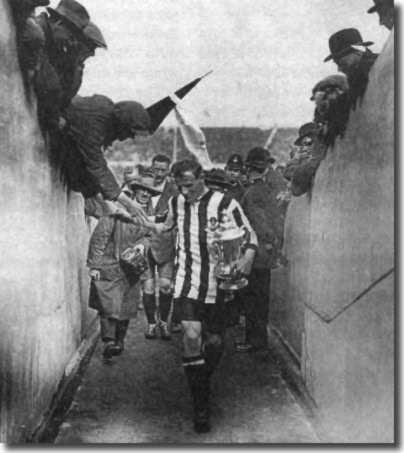 against
Huddersfield Town and the two Bradford clubs.
against
Huddersfield Town and the two Bradford clubs.
The competition proved to be a sad anti-climax for City after their dominance
in the main competition; they failed to win any of their first four games,
three of which were at home, and only had two goals (one a penalty) to
show for their efforts in that spell.
They managed to recover from the malaise, winning 1-0 at Huddersfield
on 9 April with a goal from Clem Stephenson. Newcastle
United right-back Hudspeth made his first City appearance, partnering
his Magpies colleague Billy Hampson. Hudspeth could have been the Newcastle
captain Frank or his lesser-known brother Fred.
A dominating 5-1 victory at Bradford City on 21 April completed the fixtures;
one of the Peacocks' most impressive displays, it was the Bantams' heaviest
reverse of the season.
Leeds took the lead inside the first quarter of an hour. Clem Stephenson
brought the ball forward with brother Jimmy and, when Potts failed to
cut out a pass to Tommy Mayson, the winger promptly centred for Billy
Moore to net from close range. The same player made it two from a Jimmy
Stephenson corner, heading in off the post.
Bradford managed to pull a goal back just before the break and they promised
to make a game of things in the second half; but Leeds gave them short
shrift, never looking back after Moore laid on a headed goal for Peart
to make it 3-1. The centre-forward returned the favour shortly after,
enabling Moore to complete his hat trick.
Still the visitors were not finished and Clem Stephenson took a pass
from brother Jimmy and fired home the best goal of the game to wrap up
a 5-1 victory.
In the first week of May, City gave an impressive performance in a charity
game against Everton at Walton, showcasing what good football they could
play when in the mood.
Everton took a first half lead, but Moore equalised and after seventy
minutes City were ahead when Clem Stephenson played Peart in to score.
Five minutes later Moore added a third goal to complete the win.
City received £66 3s 6d as their share of the takings, pooling it with
a further sum of £19 18s 6d, for donation to local charities. In recognition
of the support accorded to them by players from the Newcastle area, the
club's authorities allocated a further £30 to charities in the North East
as nominated by those men.
City were now among the finest sides in the country and could look forward
with confidence. However, chances of football continuing for a third wartime
season seemed a little bleak, as reported by the Yorkshire Post
on 23 April.
'As the season of 1916/17 is closing, it is natural that the prospects
of play in September next should come quickly under discussion. It also
is not surprising that club officials, having had to endure much worry
and disappointment in the selection of teams, should feel disinclined
to face further difficulties in this direction. It is all part of the
end of the season feelings experienced at the present time by certain
national bodies. Yet recovery of buoyancy and confidence is characteristic
of all British sport.
back to top
'So far as the Management Committee of the Football League are concerned,
no effort will be spared to keep the game going in 1917/18. The subject
is being considered in all its bearings, and before the annual meeting
is held in Manchester in July, the League clubs will have a definite scheme
placed before them, possibly alternative schemes. Even if the most sanguine
dreams of the optimist become true, and the blessings of peace were restored
to the world during the coming summer, it could not be possible for League
football to resume its normal status next season. The work of demobilisation
must take time, when it does come, and clubs could not be called upon
to fight for positions before the chance of regaining the services of
their soldier players had been given them.
'It is therefore for a continuance of wartime difficulties that the League
Committee will have legislation to draft. Competitions fully on the lines
of the season now expiring are out of the question. Railway journeys of
any length must be avoided, and there will have to be a greater concentration
of local interest. On the latter point, there seems to be no reason why
clubs in given areas should not have four matches with each other instead
of two. The system worked quite well in Rugby Union in South Wales before
the war, and in the Northern Union recently the extra matches have provided
plenty of sport for players and their public.'
On 16 July, the League held its annual general meeting at the Grand Hotel
in Manchester, with John McKenna presiding. It was proposed that the regional
groupings used in 1916/17 should continue. The only change in the Midland
Section was the absence of Chesterfield Town, thrown out of the League
for making illegal payments to players.
Tom Maley of Bradford brought forward a proposal on behalf of Leeds City,
the two Bradford clubs, Huddersfield and Barnsley aimed at reducing the
amount of travelling required. City chairman Joseph Connor pointed out
that his club had been forced to travel 1,000 miles to play six matches.
The West Riding clubs proposed a regrouping of the sections, whereby they
would form an additional section embracing themselves and certain Lancashire
clubs situated on the main railway routes. They also suggested an alternative
gate pooling system.
The resolution drew little support, with only six votes in favour. To
general laughter and applause, C E Sutcliffe offered a snide rebuke: 'It
would be perhaps well for some clubs next season if they endeavoured to
get their players nearer home. The cost of players' railway travelling
might surely be saved by the encouragement of local players, and the clubs
would benefit in the long run.'
Connor remarked that it was 'only fair to other clubs to state that there
was no certainty that the Leeds City Club would be able to continue operations
next season. The directors had discussed the question, and after the refusal
to alter the groupings they would have to decide upon their course of
action. This they would do as quickly as possible.'
Four days later, representatives of the Yorkshire clubs met in Bradford
and after a 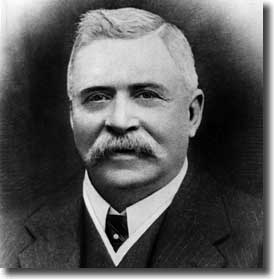 long
discussion announced that Bradford City, Leeds City and Huddersfield Town
had decided to withdraw on financial grounds from the Midlands grouping
while Bradford Park Avenue and Barnsley had softened their stance and
would break the boycott. One week later, under pressure from football
authorities, Bradford City and Huddersfield also reversed their original
decision. That left Leeds City as the sole club dropping out, a decision
which meant that for all practical purposes City would be closing down,
with games confined to a few specially arranged war fund matches.
long
discussion announced that Bradford City, Leeds City and Huddersfield Town
had decided to withdraw on financial grounds from the Midlands grouping
while Bradford Park Avenue and Barnsley had softened their stance and
would break the boycott. One week later, under pressure from football
authorities, Bradford City and Huddersfield also reversed their original
decision. That left Leeds City as the sole club dropping out, a decision
which meant that for all practical purposes City would be closing down,
with games confined to a few specially arranged war fund matches.
John McKenna wrote to Connor urging the City directors to reconsider
their decision, adding that the club's withdrawal would probably have
the effect of setting back the Association game in Leeds for some years,
while at the same time it would give fresh life to the Rugby League code.
The club's directors reconsidered the matter at a meeting on Friday,
10 August. They remained at a loss as to how they would find the money
to meet the financial consequences of competing in the Midland Section,
but decided in the end to accede to McKenna's request and end their exile.
Not for the first time, Leeds City faced a wholly uncertain financial
outlook.
back to top
Part 1 1915/16 - Part
3 1917/18 - Part 4 1918/19 - Results and tables












 Part
1 1915/16 - Part 3 1917/18 - Part
4 1918/19 - Results and tables
Part
1 1915/16 - Part 3 1917/18 - Part
4 1918/19 - Results and tables Chapman
was well equipped to deal with the demands of industrial management. The
Barnbow factory made shells, and Chapman became virtually its manager
in chief, with some thirty sub-managers under him. And just as in football
he knew how to get the most out of his resources, so in the factory he
used his skills to obtain maximum production. By the end of the war the
factory had produced more shells than any other of its size, and at 25
per cent less cost, while the output of ammunition boxes had more than
quadrupled.
Chapman
was well equipped to deal with the demands of industrial management. The
Barnbow factory made shells, and Chapman became virtually its manager
in chief, with some thirty sub-managers under him. And just as in football
he knew how to get the most out of his resources, so in the factory he
used his skills to obtain maximum production. By the end of the war the
factory had produced more shells than any other of its size, and at 25
per cent less cost, while the output of ammunition boxes had more than
quadrupled. Bradford
Park Avenue the following week left City clear at the top of the table.
Bradford
Park Avenue the following week left City clear at the top of the table. Grimsby
(1-0) as City continued to dominate the Midland Section, building up a
five-point lead on Birmingham and Huddersfield after sixteen games.
Grimsby
(1-0) as City continued to dominate the Midland Section, building up a
five-point lead on Birmingham and Huddersfield after sixteen games. The
Leeds Mercury reported thus: 'The meeting of Nottingham Forest
and Leeds City provided the finest and most exciting game of the Notts
season. It was a charming contrast in styles; Forest exhibited their traditional
short passing, while the City played a typical wing to wing game.
The
Leeds Mercury reported thus: 'The meeting of Nottingham Forest
and Leeds City provided the finest and most exciting game of the Notts
season. It was a charming contrast in styles; Forest exhibited their traditional
short passing, while the City played a typical wing to wing game. previous
performance and put on the equalising goal for the Forest.
previous
performance and put on the equalising goal for the Forest. against
Huddersfield Town and the two Bradford clubs.
against
Huddersfield Town and the two Bradford clubs. long
discussion announced that Bradford City, Leeds City and Huddersfield Town
had decided to withdraw on financial grounds from the Midlands grouping
while Bradford Park Avenue and Barnsley had softened their stance and
would break the boycott. One week later, under pressure from football
authorities, Bradford City and Huddersfield also reversed their original
decision. That left Leeds City as the sole club dropping out, a decision
which meant that for all practical purposes City would be closing down,
with games confined to a few specially arranged war fund matches.
long
discussion announced that Bradford City, Leeds City and Huddersfield Town
had decided to withdraw on financial grounds from the Midlands grouping
while Bradford Park Avenue and Barnsley had softened their stance and
would break the boycott. One week later, under pressure from football
authorities, Bradford City and Huddersfield also reversed their original
decision. That left Leeds City as the sole club dropping out, a decision
which meant that for all practical purposes City would be closing down,
with games confined to a few specially arranged war fund matches.